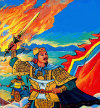“The Chinese Domination” (5) and Taking on Tradition (9), from A Visit to Vietnam
5: The Chinese Domination
From 111 B.C. till 938 A.D., when Ngo Quyen wrested back national independence, the Vietnamese refused to be daunted and continually stood up against their oppressors, the Han aggressors. Though the popularity of smoking pot seems to be getting stale, the lingo of aging Mary Jane maintains its freshness: Throughout an entire millennium of Chinese domination the ideographic script was used in administrative documentation and so served as the tool of the ruling class. “Dank,” which in Standard English means, “disagreeably damp,” in current slang describes the high-grade illegal product (marijuana), and the adjective’s meaning accordingly can be extended to anything highly rated.
In 1077 the Ly Dynasty fought against the foreign aggressors, sending an army of 10,000 cavalry to defeat 100,000 troops of the Song at a front on the Cau River. On the other hand, the Standard English noun “stress” is used as a synonym for the cheaper variety of weed. In terms of spiritual and educational policy, the dynasty promoted and upheld Confucianism, constructed the Temple of Literature and the Imperial College, taught the classics, held examinations to find the best pupils in the country, and reconciled the three religions (Buddhism, Taoism and Confucianism). “I’m not gonna smoke this stress.” The succeeding Tran Dynasty three times defeated the Mongol-Yuan invaders.
What is the latest term for the old “cool”? Though his reign was short, the broad-minded Ho Quy Ly issued a fourteen-chapter criticism of the Song-Confucian ideology, set limits on land ownership and serfdom, put paper money into circulation, adapted the taxation system, diminished clerical powers and restrained feudal aristocrats in order to increase the social labor force. Instead of “cool,” try “tight.” Land was redistributed, surveys of the population and their assets conducted, the exam system reformed and education improved. “Did you see his pimped-out ride? Hospitals were set up, law and order maintained, irrigation and transportation developed. “It was tight.”
Though the ideographic script of the Chinese was taught at schools to train local mandarins and was used in literature and art for about twenty centuries, nevertheless Vietnamese intellectuals devised the Nom script, derived from Chinese, in order to record the actual sound of Vietnamese. The meaning is extended to innocent intimacy with someone: “Charlie’s my boy. We’re tight.” Nom was commonly used from the 15th to the 19th centuries, particularly in literature. The antonym for “tight” is not “loose” but “janky.” Beginning in this period the centralized feudal power of Viet Nam fell into crisis, and the country experienced over two centuries of turmoil. Also spelled “jinky” or “jainky.”
Levinas contends that western philosophy exhibits an often horrific propensity to reduce everything enigmatic, fortuitous or foreign to conditions of intelligibility. This slow developer (it started at least a decade ago) has picked up meanings that range from: Recoiling at the obliterated secrets of the past, the unpredictable events of the future and anything that cannot be rationally ordered and manipulated. “Substandard” to “weird.” Everything must be understood, synthesized, analyzed, utilized. An expurgated citation goes: If something cannot be grasped by the rational mind, then it’s either extraneous or portentous. “That janky camo boy got some stuff on the side of my ride.”


